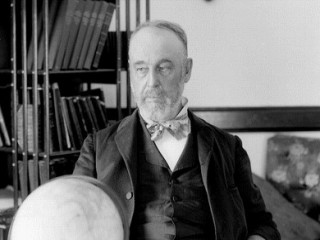
Asaph Hall biography
Date of birth : 1829-10-15
Date of death : 1907-11-22
Birthplace : Goshen, Connecticut
Nationality : American
Category : Science and Technology
Last modified : 2010-12-23
Credited as : Astronomer, discovered the two satellites of the planet Mars,
The American astronomer Asaph Hall discovered the two satellites of the planet Mars and was an important figure in government scientific circles during the period following the Civil War.
Asaph Hall was born in Goshen, Conn. He attended the district schools until he was 13. At 16 he was apprenticed to a carpenter, and he worked at that trade sporadically. His education in astronomy was spotty at best. He attended the Norfolk Academy to study mathematics one winter, spent a year and a half at Central College at McGrawville, N.Y., and received special instruction in astronomy from F. F. E. Brünnow during 3 months at the University of Michigan.
After a period as a schoolmaster in Ohio and some months working as a carpenter, in 1857 Hall finally secured a position at the Harvard Observatory. This gave him the opportunity to attend lectures and informally complete his education. He immediately proved to be a brilliant observer, and in 1859 he began to send papers, chiefly on the orbits of comets and asteroids, to scientific journals. In 1862 he went to Washington as an aide in the Naval Observatory and the following year was appointed professor of mathematics there. In 1872 Hall was made chief of the Naval Observatory. Five years later Hall, using the observatory's new 26-inch telescope, discovered the satellites of Mars.
Hall achieved a reputation as an extremely careful observer and an accurate mathematician and computer. In his lifetime he was the recipient of numerous scientific awards in the United States and abroad. His nearly 500 published papers include investigations of the orbits of the various satellites, the mass of Mars, the perturbations of the planets, the advance of Mercury's perihelion, the parallax of the sun, stellar parallax, the distances of Alpha Lyrae and 61 Cygni, the mass of Saturn's rings, and the orbits of double stars, along with the solution of many mathematical problems suggested by these investigations. Disdainful of textbooks and popularizations, Hall refused to publish a book.
Following his retirement from the Naval Observatory in 1891, Hall taught at Harvard and continued to work in astronomy. His first wife died in 1892; in 1901 he married again. In 1902 he was elected president of the American Association for the Advancement of Science. He published his final paper in September 1906 and died on Nov. 22, 1907.
There is no book-length study of Hall. One source is David B. Hall's genealogical and biographical study, The Halls of New England (1883).
















